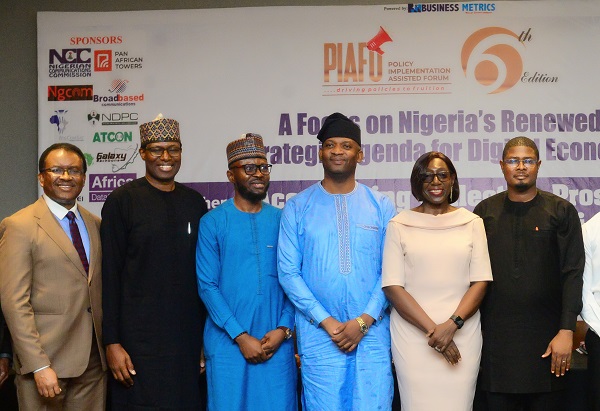
Stakeholders in the telecommunications industry have highlighted several obstacles that could hinder the Federal Government’s plan to deploy 90,000 kilometres of fibre optic cables across Nigeria. They pointed out that issues like Right of Way (RoW) charges, multiple taxation and levies, which are controlled by state governments, could potentially derail the project.
Speaking at the sixth edition of the Policy Implementation Assisted Forum (PIAFO) in Lagos on Wednesday, participants focused on Nigeria’s renewed strategic agenda for the digital economy. They emphasised the need for successful implementation of the project, which aims to enhance connectivity and provide the Nigerian digital economy with the necessary backbone infrastructure.
Presenting a paper titled ‘Harmonising Nigeria’s Fibre Deployment Strategies for Effective Implementation,’ the executive director of Broadbased Communications, Mr. Chidi Ibisi noted that while the government’s special purpose vehicle (SPV) initiative is a commendable plan to bridge the digital infrastructure gap, it must address existing challenges. “The issues of high cost of Right of Way (RoW), destruction of fiber by road construction companies, and vandalism need to be addressed for this new SPV initiative to be successful,” he said.
Highlighting the challenges faced by telecom operators, group chief operating officer of WTES Projects Limited, Mr. Chidi Ajuzie pointed out that the informal RoW charges by local hoodlums present significant hurdles. “For states, a formal right of way is set and some states are adopting it, but the informal side is where the complexity arises. When trying to lay fibre in some Lagos communities, so-called landowners (omo onile) demand charges from one street to another. How can we achieve adequate broadband infrastructure under these circumstances?” he questioned.
Chairman of the Association of Licensed Telecommunications Operators of Nigeria (ALTON), Engr. Gbenga Adebayo stressed that for the 90,000 kilometers fibre project to succeed, state governments must take ownership. “State governments seeing RoW as internal generated revenue (IGR) should be a thing of the past. We can’t talk about a digital economy on one side and view service providers as revenue sources on the other. While governors may promise free RoW in Abuja, they impose numerous levies at home, negating the initial incentive,” he explained.
CEO of Open Access Data Centre (OADC), Dr. Ayotunde Coker emphasised the necessity of private sector execution for the fibre project, even as the World Bank is expected to fund it with up to $3 billion. “The World Bank can provide funding, but it needs private sector partnerships as the execution engine. Policies should enable the private sector to execute effectively. Learning from past mistakes is crucial for achieving new broadband penetration targets,” he noted.
Coker further stressed that meaningful broadband is essential, rather than just a high megabit per second implementation. “We need superhighway fibers and backbone distribution to fan out. State governors must provide an enabling environment for infrastructure roll-out. Non-participation will hinder state growth,” he added.
In his opening address, PIAFo convener, Mr. Omobayo Azeez highlighted the conference’s role in creating a dialogue platform for digital economy stakeholders from both the public and private sectors. The goal is to brainstorm, exchange perspectives, clear grey areas, harmonise thoughts and foster a sense of collective responsibility towards accelerating collective prosperity through technical efficiency.
Azeez stated that the new digital economy blueprint of the federal government not only sustains existing policy directions and targets but also challenges stakeholders to attain new frontiers. The summit’s theme, “Accelerating Our Collective Prosperity through Technical Efficiency,” encapsulates this forward-thinking agenda.
Stakeholders at PIAFo underscored the importance of addressing the identified obstacles to ensure the successful implementation of the Federal Government’s 90,000 kilometres fiber project. Collaboration between the public and private sectors, supported by effective policies and the active participation of state governments, is essential to overcoming these challenges and advancing Nigeria’s digital economy.


